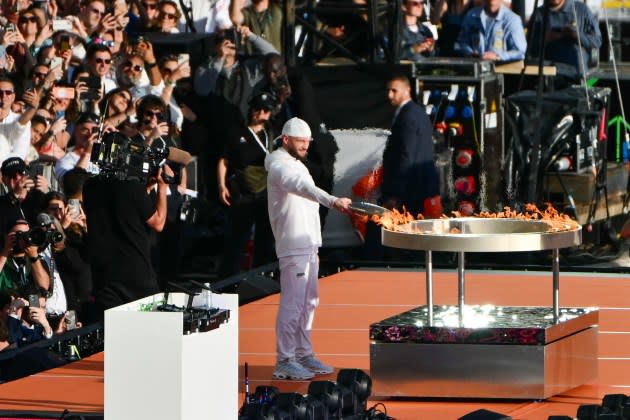Olympic Flame Arrives In France Amid Tight Security In Test Run For Paris Opening Ceremony

The Olympic flame touched down in France on Wednesday with some 150,000 people gathering in the southern city of Marseille’s historic port area to watch its transfer onto French soil after a 12-day journey from Greece in a hundred-year-old three-masted sailing ship.
The ceremony is being seen as a test run for the opening ceremony on July 26 of the 2024 Paris Summer Olympic Games, in terms of crowd control and security.
More from Deadline
Around 5,500 security staff were mobilized for the event, 2,400 of them police officers, with a security perimeter set around the spectator area and more than 500 plain-clothed police officers mingling with the crowds.
The flame’s arrival in France sparked a day of debate in the local media on whether the country and Paris in particular would be ready for the 2024 games running from July 26 to August 11, both physically and in spirit.
A question still hangs over ambitious plans to hold the opening ceremony on and along the River Seine, rather than in a stadium.
The organizers and Sports Minister Amélie Oudéa-Castéra originally suggested around 500,000 to 600,000 spectators would be allowed into a securitized sector running some six kilometers along the banks of the Seine.
In March, Interior Minister Gérald Darmanin announced that the number would be closer to 326,000 and possibly lower, due to crowd control measures as well as security concerns amid a heightened terrorism threat.
French President Emmanuel Macron then revealed in an interview in April that a Plan B and a Plan C were also being prepared which could see the ceremony limited to the area around the Trocadero area opposite the Eiffel Tower or moved into a stadium in the case of a high terror threat.
“This ceremony along the Seine, it’s the first in the world. We can do it and we’re going to do it,” Macron said, but adding other iterations were also being prepared in parallel.
More generally, there has been pushback from some quarters over the cost of the games when parts of the population are struggling with the rising living costs. With just over another two months to go, there is a sense that the country has yet to get excited about the prospect of the games.
Macron told media on Wednesday that he believed the arrival of the flame in France would galvanize popular support.
“It’s normal, daily life can be difficult, and we have a heavy news at the moment. Here, I feel like we’re entering the games. The flame is here, in Marseille, on French soil,” he told reporters in Marseille.
“It is going to stay with us until the end of the Olympic Games in September [the Paralympics run from August 28 to September 8]. It’s time for popular enthusiasm and celebration among the French people.”
As per tradition the torch carrying the flame was lit in the birthplace of the ancient games in Olympia in Greece on April 16. It then travelled around Greece before being carried on board French sailing ship the Belem, which is believed to have been built around the same time as the first edition of the modern Olympic Games in 1896.
The ship arrived off the coast of Marseille on Tuesday and was then accompanied by around 1,000 small boats as it approached Marseille’s historic port. It entered the port to a blast of red, white and blue fireworks, a fanfare, the French La Marseillaise, and a fly-pass by France’s French Acrobatic Patrol.
French Olympic 2012 50-meter freestyle swimming champion Florent Manaudou was charged with task of transferring the flame encased in a metal canister on to dry land. He then handed it to Paralympic Gold Medal-winning athlete Nantenin Keita. The honor of lighting the Olympic cauldron went to Marseille-born rapper Jul.
The Olympic Torch will now be carried around France touching down in key sites such as the Lascaux caves, Mont Saint-Michel and the Verdun Memorial and the D-Day Landing Beaches.
Best of Deadline
Hollywood & Media Deaths In 2024: Photo Gallery & Obituaries
Step & Repeat Gallery: The Best Red Carpet & Party Photos Of 2024
2024-25 Awards Season Calendar - Dates For Oscars, Tonys, Guilds, BAFTAs, Spirits & More
Sign up for Deadline's Newsletter. For the latest news, follow us on Facebook, Twitter, and Instagram.

 Yahoo Movies
Yahoo Movies 
